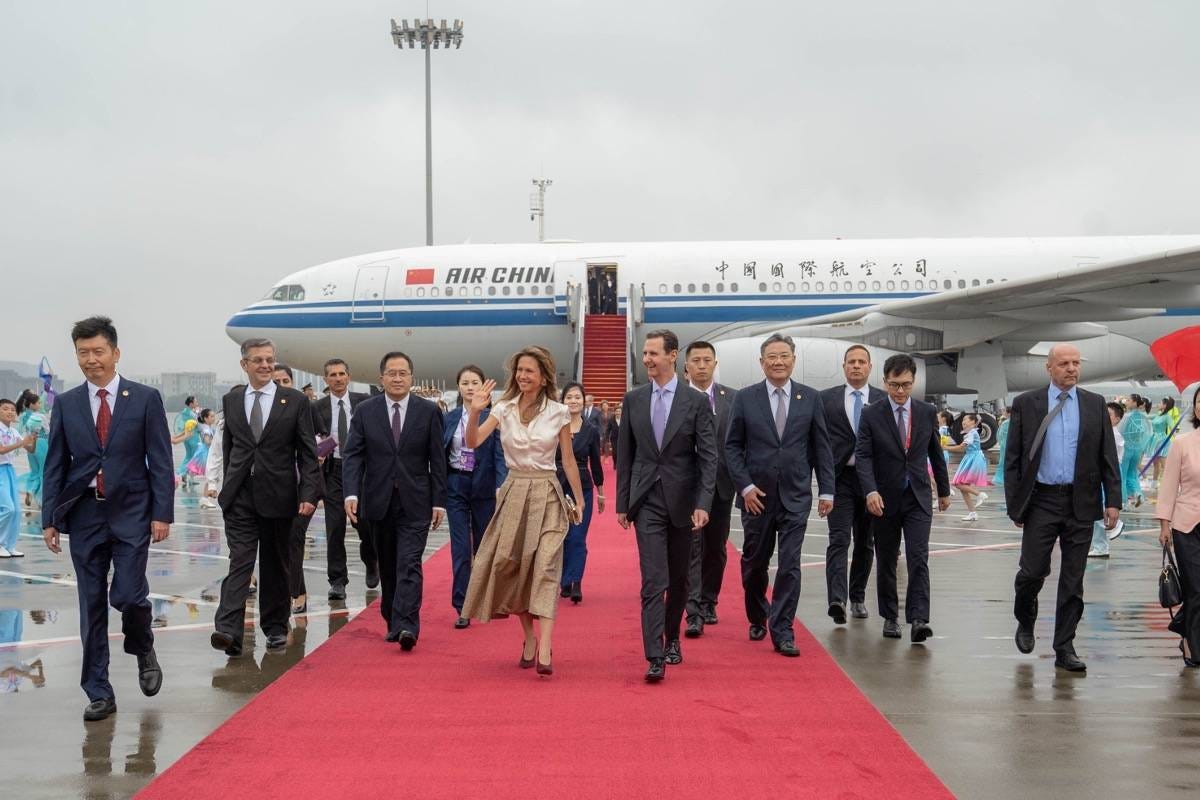Assad lands in China, MBS continues courting Israel
MBS threatened to boycott US weapons manufacturers.
A journalist asked me what I make of Assad's trip to China and I would like to share my answer with the readers. I also watched MBS interview for Fox news and would like to share some insights.
Assad trip to China coincided with Netanyahu's visit to the US before Bibi is also due to visit Beijing in the coming weeks. Just less than two weeks after the announcement of the IMEC which is the US proposal to counter China's Belt and Road Initiative in the Middle East. It is clear both Syria and Israel are trying to get on China’s good side and market themselves as more valuable to its strategic interests in the region. Israel will likely try to sell the IMEC to China as a complimentary effort to its own BRI efforts making the region a pool of stability and prosperity. Israel will also likely urge China to ease its stance on Palestine by offering some economic concessions that tilt the cost/benefit analysis of the Chinese favourably to Israel. Effectively, China stance only changed on rhetorical level but practically China remains pro-Israel.
Assad is likely to demonstrate to China how its geoeconomic interests in Syria have suddenly changed making it a priority. If China wants to spoil the Mediterranean route of the IMEC, Syria will be an important asset. This shall motivate the Chinese for the first time since the civil war broke to take Syria more seriously and invest in its reconstruction in defiance of Western sanctions. Using the yuan, China can fundamentally change the trajectory of Syria. This will make it more capable of acting as an alternative and a disruptor if needed.
The visit also wishes to show that Syria is not isolated and the west boycott of Assad might come at a great cost to its plans in the region. Hence, engaging Syria will remain necessary as gulf countries have been urging their European counterparts recently.
The west reaction to the visit will be carefully studied in Beijing and Damascus and ties will experience an uptick moving forward. Israel will likely find it hard to convince the Chinese that they have not taken sides in its rivalry with the US. The China-Israel-Syria-Palestine dynamic is due for a potential reshuffle sooner than thought.
On MBS's interview with Fox, despite the media hype, it does not really say anything thing new about Saudi plans for the region. Vision 2040 was early announced and is expected to carry on Vision 2030 programmes. On Israel, MBS showed a positive and hopeful stance that a US brokered peace talks will lead to normalisation ultimately. But MBS highlighted that this is a process rather than a done deal as many imagine and describe. As we learn from the US-led peace process in Palestine-Israel, processes take time, experience setbacks, and may ultimately not lead anywhere. MBS publicly brushed off the idea of Palestinian statehood. This might be a recognition of the one state reality or simply an appreciation for the unwillingness of the Israeli government to offer any meaningful concessions to the Palestinians. Israel is in no need to offer the Saudis any concessions on Palestine as Saudi has zero leverage. The Saudis ultimately need the Israelis more than the Israelis need them. Of course a regional war will fundamentally alter the pair calculus as it becomes clearer where is the actual regional balance of power at rather than the imagined one.
When nukes were brought up, MBS took issue with Iran going nuclear but overlooked the fact that Israel has nuke already. This is a tacit recognition that Israel and Saudi are not at war. However, MBS dismissal of the power that comes with having nukes comtradicts his worry about an Iranian nuclear weapons programme. If Iran cannot use nukes, then Saudi does not have to worry whether Iran gets them or not. It then becomes mostly about prestige and image rather than security.
Lastly, and the most important point in my view, MBS threatened US weapons manufacturers of stopping to buy US made weapons and pledge to buy elsewhere if he does not get what he wants. He explicitly said it will be a big loss to the US economy and the resilience of its military supply chain. It is no wonder that he chose Fox to make such a threat given its known political affiliation with the military industrial complex which is vital to the health of the US economy. For context, it was recently revealed that Raytheon has cancelled billions worth of contracts with Saudi over concerns about potential connections to China and Russia.
MBS, overall, comes across as someone concerned with numbers. Like an MBA graduate. He seemed less concerned about politics, human rights, and more geared towards achieving the numerical targets of Vision 2030. However, lots of the growth he spoke of was due to tremendous public spending and capital injection rather than productivity led growth. Saudi has been struggling to attract FDI. Even at its peak, much of the capital was Saudi capital coming home rather than foreigners making bets. To see whether Saudi increases its non-oil related GDP meaningfully will take time. The government just announced plans to raise 11 billion in debt to fund spending a signsl of the more needed work.
I think MBS plans will be faced with many geopolitical challenges and more change will have to happen before Saudi economy is properly diversified and resilient as he envisages.


